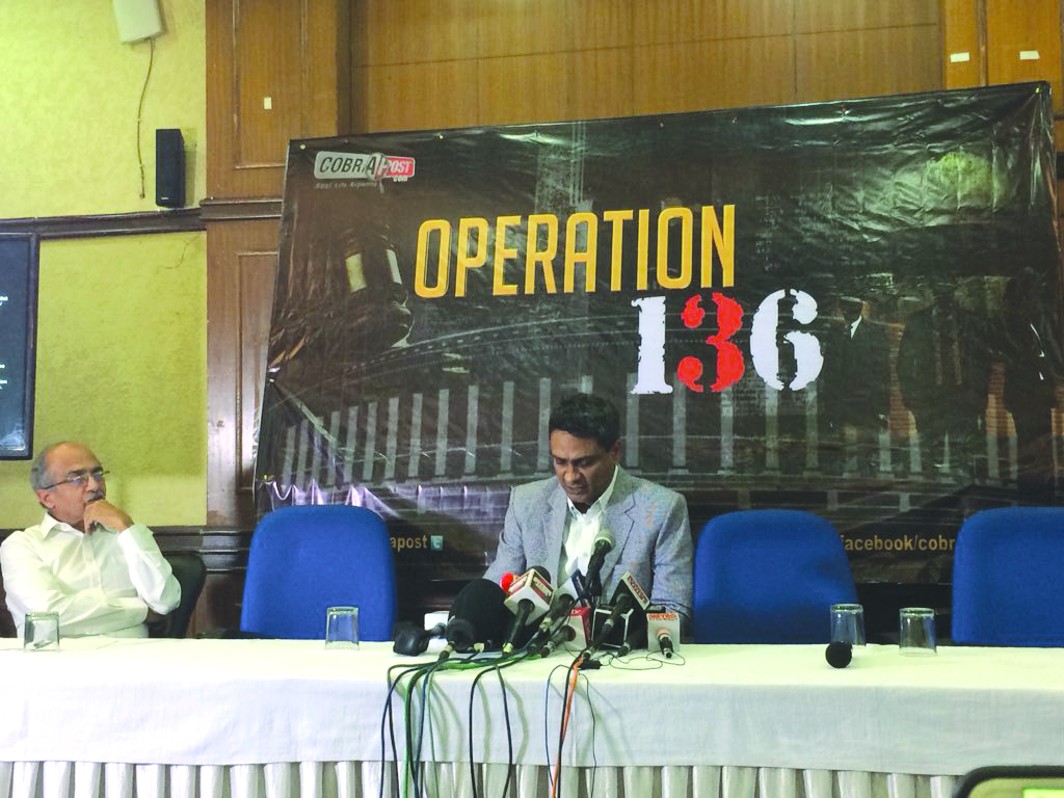Cobra’s Sting
 The sensational Cobrapost exposé last week has literally caught prominent names in the media with their pants down. The sting, Operation 136, was aired, appropriately, at the Press Club of India. It showed sales representatives, and in two episodes, an editor and an owner, of multiple media organisations agreeing to run pro-Hindutva stories or willing to target opponents of the rightwing for a fee. Some reporters from the media outlets featured in the exposé were in the audience, and were seen leaving the venue well before the end, along with representatives of TV news channels which adopt a pro-right wing stand, out of ideological affinity. Incidentally, 136 refers to India’s ranking in the World Press Freedom Index. The sting also revealed inner battles in the BJP. Hindi Khabar editor-in-chief Atul Agrawal was heard agreeing to run stories against some BJP leaders and also sent the sting reporter a link to an earlier story the paper had done titled “Seven Enemies of Yogi Adityanath”. They included Maneka and Varun Gandhi, Manoj Sinha, OP Rajbhar and Anupriya Patel. Now, the media waits for the other shoe to drop: Cobrapost says they will air a sequel involving other media organisations. What Cobrapost failed to mention was whether any media organisations refused their offer.
The sensational Cobrapost exposé last week has literally caught prominent names in the media with their pants down. The sting, Operation 136, was aired, appropriately, at the Press Club of India. It showed sales representatives, and in two episodes, an editor and an owner, of multiple media organisations agreeing to run pro-Hindutva stories or willing to target opponents of the rightwing for a fee. Some reporters from the media outlets featured in the exposé were in the audience, and were seen leaving the venue well before the end, along with representatives of TV news channels which adopt a pro-right wing stand, out of ideological affinity. Incidentally, 136 refers to India’s ranking in the World Press Freedom Index. The sting also revealed inner battles in the BJP. Hindi Khabar editor-in-chief Atul Agrawal was heard agreeing to run stories against some BJP leaders and also sent the sting reporter a link to an earlier story the paper had done titled “Seven Enemies of Yogi Adityanath”. They included Maneka and Varun Gandhi, Manoj Sinha, OP Rajbhar and Anupriya Patel. Now, the media waits for the other shoe to drop: Cobrapost says they will air a sequel involving other media organisations. What Cobrapost failed to mention was whether any media organisations refused their offer.
Giving a Hoot
 Who gives a hoot could be a question asked after the media-focused website The Hoot, announced last week that it was moving from daily publishing to an archival role, as a media information and data resource. The answer to the question, however, would be—a lot of people. Launched in 2001 by Sevanti Ninan, it was a pioneering enterprise which served as India’s first media watchdog. It was the first to publish details of media ownership and editorial hierarchies and did some hard-hitting columns on how advertisers were shaping news agenda, along with almost daily accounts of manipulations in newsrooms. By giving out names and fearing no one, it became the go-to site for those interested in media. Financial staying power was always a problem—it was a one-woman show, helped by freelancers who contributed for a pittance. Sevanti’s husband, TN Ninan, is involved in Business Standard where he is a shareholder. She was unable to find a business partner for the funding. It leaves a large hole in the country’s mediascape.
Who gives a hoot could be a question asked after the media-focused website The Hoot, announced last week that it was moving from daily publishing to an archival role, as a media information and data resource. The answer to the question, however, would be—a lot of people. Launched in 2001 by Sevanti Ninan, it was a pioneering enterprise which served as India’s first media watchdog. It was the first to publish details of media ownership and editorial hierarchies and did some hard-hitting columns on how advertisers were shaping news agenda, along with almost daily accounts of manipulations in newsrooms. By giving out names and fearing no one, it became the go-to site for those interested in media. Financial staying power was always a problem—it was a one-woman show, helped by freelancers who contributed for a pittance. Sevanti’s husband, TN Ninan, is involved in Business Standard where he is a shareholder. She was unable to find a business partner for the funding. It leaves a large hole in the country’s mediascape.
Vice-Versa
 Vice, the popular North American digital media and broadcasting company, is creating a buzz even before its formal launch in India, and it does not augur well for its future. Last year, the US-Canadian company had tied up with The Times of India as part of its global expansion, hired a 40-member staff and conducted a soft launch prior to inaugurating full-scale operations next month. Last week, it faced its first major embarrassment when its managing editor, Rishi Majumder, and news editor Kunal Majumder, quit. In their resignation letters, they revealed how a website known for taking risks and being anti-establishment, has decided to play safe in India and avoid offending the Narendra Modi government. The story they quit over, which was censored, they say, was on an ABVP activist who is gay. The decision to pull the plug on the story has placed a big question mark over Vice’s impending India operations. The resignations follow on the heels of Pragya Tiwari, who quit as head of content a month ago. In their resignation letters, the two Majumders, who are not related, blamed Chanpreet Arora, CEO of Vice India, and Samira Kanwar, its new chief of content, for the introduction of self-censorship.
Vice, the popular North American digital media and broadcasting company, is creating a buzz even before its formal launch in India, and it does not augur well for its future. Last year, the US-Canadian company had tied up with The Times of India as part of its global expansion, hired a 40-member staff and conducted a soft launch prior to inaugurating full-scale operations next month. Last week, it faced its first major embarrassment when its managing editor, Rishi Majumder, and news editor Kunal Majumder, quit. In their resignation letters, they revealed how a website known for taking risks and being anti-establishment, has decided to play safe in India and avoid offending the Narendra Modi government. The story they quit over, which was censored, they say, was on an ABVP activist who is gay. The decision to pull the plug on the story has placed a big question mark over Vice’s impending India operations. The resignations follow on the heels of Pragya Tiwari, who quit as head of content a month ago. In their resignation letters, the two Majumders, who are not related, blamed Chanpreet Arora, CEO of Vice India, and Samira Kanwar, its new chief of content, for the introduction of self-censorship.
Scroll Down—for a Fee
The pioneering news website, Scroll, may be setting another trend—pay as you go, or scroll. The digital platform is experimenting with a subscription-based model. It is not strictly a Paywall yet, but is offering a more exclusive product for subscribers. Readers can continue to read all the latest articles put out on the site but subscribers get more—they have access to all past articles, an ad-free site, and more exclusives are on the way. Readers can continue to access content for free but will have to cope with distraction from ads. Most of these are what is called native advertising, articles sponsored by advertisers. Many print publications in the West have experimented with variations on the Paywall, with mixed results. In India, news websites will be closely tracking the response to Scroll’s new avatar.


